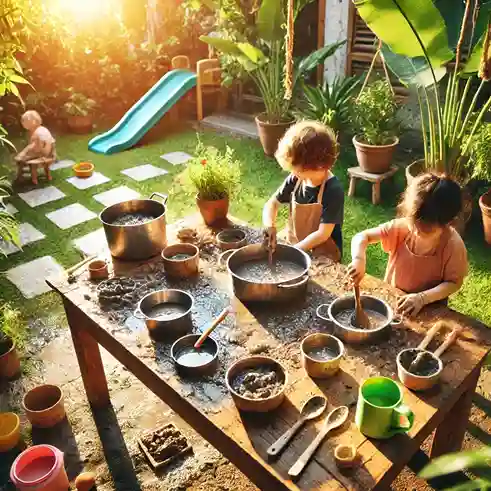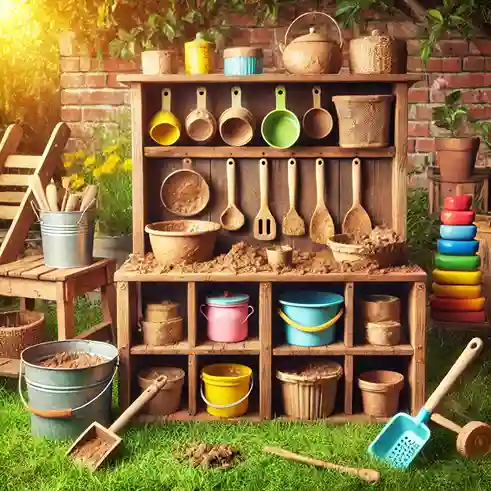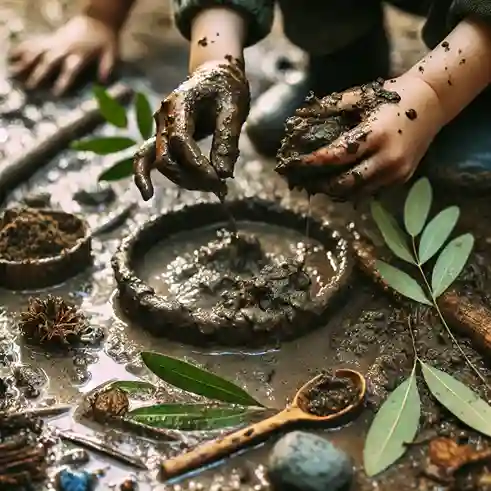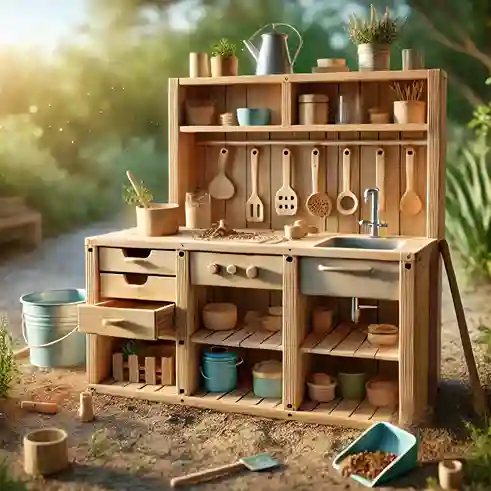Introduction to Wooden Mud Kitchen
A wooden mud kitchen is a product that would encourage children to spend time outdoors as it allows for free play through deep imaginative and sensory experiences. In essence it looks like a small outdoor kitchen where children can play pretend cooking with natural elements like mud, sand and water. Usually they consist of wall mounted cabinets, cooking tools, and sinks which are made of sturdy and environmentally friendly wood and increases the creativity and environmental consciousness of the child during fun time.
Wooden mud kitchens are popular not only because of their fun and captivating appearance, but also because of their contribution to different forms of child development. Functionally, they enable children to work with natural elements, thereby developing their fine motor skills while digging, scooping and mixing ‘ingredients’ together. In addition, the absence of set rules regarding fillings of mud kitchens promotes social interaction, as children are able to combine their effort, share and take different roles during play to achieve a common goal. This play equipment hence serves as a great source of social interactions, as well as, self activities.
The employment of wood as the core substance has more advantages than using materials that are artificial. Wood is a natural insulator thus making the kitchen more versatile in relation to the existing weather changes. Also, it adds a middle man experience that extends sensory play allowing children to touch and feel the temperatures and textures of the natural elements. Most educators and parents tend to opt for wooden structures because of their durability as well as beauty that harmoniously blends in with the outdoor setting encouraging children to use their imaginations to prepare culinary fare that they desire from scratch and explore nature.
Fostering Creativity and Imagination

A mud kitchen made of wood is an experienced impact in ensuring children’s imagination and creativity is at heightened levels when they are activating their play. Whereas normal toys are restrictive in how they are used due to having designated uses, mud kitchens do not restrict use having many possibilities. Children are encouraged to use their creativity to concoct a multitude of imaginary dishes using mud, leaves, flowers and twigs. An environment that children can explore freely and create enhances in them the ability to create in an artistic way.
The interaction with a mud kitchen provides an opportunity to the children to engage themselves in diverse role play with situations which are commonly found in real life. Playing in a way in which they cook and serve food is not just a pretend game, rather it’s a way of texture and material exploration. Engagement in this activity has the potential to lead to little narratives where children take up roles like that of a cook, a must, a ‘kitchen’ or a customer and all of these interactions are socialising activities in themselves. Such role playing or pretending is also important for the child as it aids their cognitive development, a good example is when they tell stories of their fun designer’s or food imaginarium, it boosts their speaking skills as well as helps them think critically.
Furthermore, the design of a wooden mud kitchen also has an inviting effect on children to work together. They encourage them to initiate the play by asking their friends to join, engaging them to work and talk with each other and exchange ideas and concepts. The cooperative nature of the play then enhances the imaginative travels which children go through as this helps them to understand the complexities involved in sharing and working together. Encouraging community creativity through general African design principles emphasizes the synergy that supports social exhibits are fundamental to children’s play. Thus, amaking effecive play structures for children sand a little wooden mud kitchen.
To sum up, a kitchen made of wood and mud is one of the best play equipment for children to engage with as it allows them to vividly and creatively use their imagination to achieve a multitude of tasks this is either a play area toy or lclude washing and trying.
Enhancing Social Skills through Cooperative Play

A wooden mud kitchen acts as a positive motive for children to engage in lots of group or joint play throughout the time they are at the center. Its construction encourages children to partake in tasks and activities that involve taking turns and combining fantasies together. As they spin mud into ‘cakes’ or mix leaves into ‘soups’ they are exercising their imagination but also creating important social moments.
Through joint play, the children appreciate the essence of collaboration in their work. Children, for instance, when they come together with the aim of making one pastry, they have to talk about their ideas, share those ideas, and even work on problems together. This type of interaction saves them time because it helps them to form clear ideas in their heads and makes them listen to each other more closely. Through such interaction verbal skills are developed as children are able to speak up their worries and ideas which in turn builds togetherness.
Moreover, engaging in a wooden mud kitchen can further promote a child’s empathy as well as emotional intelligence. During joint active play, it becomes necessary for them to imagine what others are thinking or feeling which cultivates broadmindedness. For instance, when a child feels neglected because another one takes control over a role, this position may lead to questions of equity and dignity and thus they become more equipped to manage disputes.
The wooden mud kitchen serves as a playground that integrates children of different nationality, thus makes them become more socially cohesive. Involvement in such activities enables children to have friends, to learn to work together and to be able to give and receive trust which are relevant aspects of social relations. The other wonderful characteristic of mud kitchen is that it is fun and at the same time orderly, therefore children are able to utilize unlimited opportunities for socialization which is the reason why mud kitchen is a desirable element of every playing area.
A wooden mud kitchen is an interesting way for children to play, this helps a lot in the cognitive development of the child. Using mortar, sticks, and other natural and rough elements gives children sensory exposure which is often important in the early years. Children experiment by measuring and mixing different elements together, this is significant because when they do this, critical thinking is fostered among them. For instance, children sometimes tend to ask questions like, ‘What would result if sand is added to water?’ or ‘What would be the ideal thickness for my mixture?’ All these encourage problem-solving skills of a child as they begin to amend their ratios and approaches based on the results they get after their children’s experiments.
Furthermore, physical exposure of children to wooden mud kitchens improves physical skills like fine motor skills which are crucial for coordination and better hand usage. These fine skills are important not for just writing, cutting important for higher order cognitive processing as these children grow old. All of them, a wooden mud kitchen does have a little rich sensory exposure that is critical in the early stages of development of a child and promotes an understanding based approach.
Also, pretend play in a mud kitchen enhances language, as children usually verbalize their movements or communicate with their peers during play. This makes children engage in dialogue and in the process grow their vocabulary and improve their communicative skills. When children are active in their play and talk about what they are doing, for instance, ‘This is how we are making a cake’ or ‘This is how we cook soup’, they are acquiring the verbal skills necessary for communication. Besides, in their play, pursuing a common plot together with their peers develops such social skills as turn-taking and negotiation which are important for future social exchanges.
All in all, the intellectual impact that using a wooden mud kitchen has is enormous including reasoning, language and problem-solving skills which ensures that more respect is given to the holistic aspects of development in the early years.
Encouraging Physical Motor Development and Growth
The wooden mud kitchen constructed entirely out of wood allows children to have a lot of physically active tasks which in turn allows for their growth and advancement in motor skills. Children who are said to experience a mud kitchen mostly take part in activities like pouring, stirring, mixing as well as using different tools which all require some fine motor skill development. The development of hand eye coordination is also necessary for those tasks, and as children gain more practice they will have the confidence and skills to do more precise movements.
Moving beyond fine movements, lying a mud kitchen allows children to play outside more often which is critical for steeping up the rate of gross movements. Children lifting and balancing different objects while squatting or standing creates more even muscle and helps in better coordination. Playing with mud, stones and water provides a physical challenge that encourages children to be creative in how they move in these ways. Also, children who play outside more often tend to be physically more healthy than those who spend a lot of time indoors, as most of them tend to play more active games when they are outside.
Engaging in mud play and other tactile activities is crucial because it enables children to be more comfortable in space and forward their proprioceptive skills. Through this level of enrichment, children are motivated to take risks and engage in more physical and mental interactions. The learning of children is not limited to just recreation but rather revolves around making their own stir fry meals and music with their hands on the kitchen table, this becomes a foundation for enlarging their physical as well as creative skills.
All in all, a wooden mud kitchen is for use when you’re ready to enhance children’s hand eye coordination as well as gross motor skills. With the incorporation of wooden toys, children are bound to increase their mobility and when coupled with growth of new activities, they will surely benefit from the variety of outdoor fun.
Strengthening the Bond with Nature

Wooden mud kitchens are excellent tools that enhance children’s bond with nature. They can use these toys to play outdoors during groups and once they are outdoors, children will be able to look around themselves and explore everything around them. Nature inclusive playgrounds provide stimulation for inquisitiveness and imagination, children understand the beauty of nature by using the materials found in nature such as mud, leaves and twigs.
Interacting with the environment through outdoor activities is critical for children’s growth andidentity development. Constructing with a wooden mud kitchen allows them to engage in a form of play that mirrors a lot of activities they see themselves as part of. Such working with mud, shaping and playing with other things around them helps the children begin to build a sense of responsibility for the world around them as well. Such kind of interaction would enhance the sense towards the understanding of the ecological system as well as the influence we impose on nature.
In addition, they have a learning experience that they are resourceful and able to sustain ‘toys’ that are found in nature when playing with them. For instance, putting some stones or using some leaves they pick up during play in their mud kitchen makes them appreciate the use of resources instead of solely using commercialized toys. Such activities allow them to appreciate the environment better and create a sense of awareness in them that is visually appealing by making them consider more steps to protect the environment. Kids learn how to relate with mother nature making them fond of the outdoors at primary school level that would help enhance this protective instinct into adulthood.
Last but not least, a wooden mud kitchen will not just focus him or her at the mud or sandbox, but it will encourage the child to build a bond with the natural world around him or her, which is a yearning that children must appreciate and respect.
Facilitating Solo Activities
Another advantage of a wooden mud kitchen is that it encourages children to engage in solo play. Unlike other toys that often require guidance, a wooden mud kitchen allows children to freely control how they play with it. The ability to engage in solo play and independent action is crucial in nurturing a child as it fosters the growth of their self-oriented aspects through interacting and playing with their surroundings. Such form of play is extremely necessary for children growth, as it encompasses both sides of the brain and social areas where choosing, trying, and finding the solution can happen without a helping adult.
To begin with, a wooden mud kitchen dishes are designed to enhance this as they allow free play. Children seem to relish the choice of deciding what they want to do – whether it is mixing mud, stirring potions made from leaves or ‘baking’ during role play. Such choice encourages innovation and creativity, which makes the wooden mud kitchen extremely useful in independent activity learning. Then, as the children mix the natural resources with those to create other resources, they get to understand about the touch of material, how it feels like in different colors, and the physics involved in combining them, thus giving promotion into discovery learning.
Furthermore, supportive of self-directed play is said to enhance children’s critical judgement capabilities. Children learn to appreciate their choices and the outcomes of those choices when they are given an opportunity to decide what the best way to interact with their surroundings is. This self-determined play adds to their level of self-confidence and sense of control. On the whole, the placement of a wooden mud kitchen within the children activities’ scope is crucial in terms of nurturing self-sufficient independent imaginative children who have the capacity to traverse their world in a supplementary and resourceful manner.
Strength Of Wooden Mud Kitchen
The wooden mud kitchen has emerged in the market because there is a need for durable and robust material for children’s play. One of the key benefits is the rot and decay free character of wood as opposed to plastics which has load of fragility issues. Quality wooden mud kitchen are made to last rough use, be weather resistant, and remain intact over the years. In contrast to other uses that have borders, age brings concern that treated wood surfaces do not crumble and that they may stretch without stretching, preventing the plastic from cracking and snapping. From the kaleidoscope of active, happychildren this makes certain that the investment will last for many play dates full of joy.
In comparison to wooden items, plastic kitchen toys are less sustainable. In order to ensure that it is eco-friendly timber is mostly used to construct wooden mud kitchen. Families who are eco-oriented prefer wood as it is a renew able source. With an environment focused society moving forward the need to cut down unnecessary waste will only grow in importance by using wooden items the tradition of hand-me downs is continued. On top of that, the use of wood reduces the problems related to an ever growing landfill problem as wooden items can be biodegraded, which in this case answers the parents worries that revolve around the use of wooden toys.
Children’s toy mats are not the only concern of the greater plethora of parents there’s also whether or not the wooden kids kitchen toys contain harmful chemicals, this is particularly common in processed plastics. Surprisingly, the kitchen mud toys don’t contain any harmful chemicals and can be safely used after completing the process which enhances the decorative appeal. The growth of hand-made and eco friendly toys can be attributed to the greater concern that parents have for their children as a large umbrella of uncertainty has cover the world. Hence, parents will be able to utilize the children’s wooden mud kitchen without worrying that it would pose as a danger to their children while providing them an eco friendly medium to play around.
Conclusion: The Capitalization of Playtime Fun
A wooden mud kitchen is a great way to increase children’s playtime while providing a variety of developmentally appropriate activities. As elaborated, these unique play structures not only provide opportunities for children to engage in pretend-play activities but also engage them in sensory activities. Such facilities give children a chance to use natural elements such as mud, water, and sand which also creates room for unique learning experiences and further encourages hands-on learning for children.
In addition, it is also important to appreciate the social elements that come along a wooden mud kitchen. During pretend play, children start to engage in team work and learn how to communicate and understand others. This cooperative aspect enables them to grasp the concepts of role relations and thus develops their social skills. Moreover, when they prepare real or faux foods together, they also have to negotiate, which makes them inventive and resourceful that promises endless possibilities in their future endeavors.
From a physical perspective, a wooden mud kitchen enhances the child’s fine motor skills as they engage in scooping, pouring, and mixing among other activities. Such activities not only help in improving their dexterity but also allow children to actively engage in fun play. Moreover, being in such outdoor settings also helps them to appreciate nature and develop a sense of environment protection from a young age.
To conclude, a wooden mud kitchen serves as more than just a play structure, it is a resource that facilitates all-round childhood development. It is recommended that parents and educators also take important playground equipment such as wooden mud kitchen with them because they are helpful for enhancing children’s physical, social and cognitive development and also the quality of play that they have. Thus, by providing such areas for imaginative play, we nurture a generation that is geared to create and discover in their surroundings.

